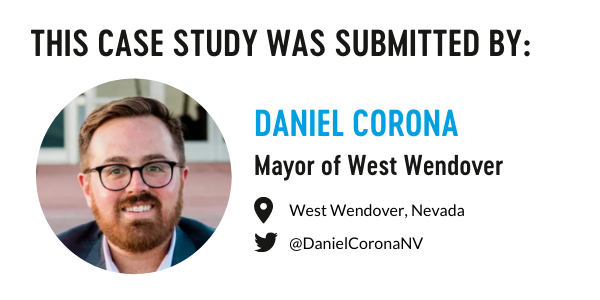Building a Downtown From the Ground Up
West Wendover, NV
population: 0-5,000 | Government type: city | Topic: development
The Program
West Wendover is a community with no downtown core for housing and commercial activity. The business section of the city is separate from the residential area, and individuals without cars have limited mobility given the current lack of a bus system. Some residents must often walk up to four miles between their home and place of employment. Many of these residents have worked in minimum wage jobs, usually casinos and fast food, for years without the opportunity to build wealth and break out of the cycle of poverty. With their new downtown investment scheme, the city plans to support the growth of small businesses, and build more affordable housing to help build community wealth for the city’s low-income residents.
The city purchased the land necessary for the scheme from the Bureau of Land Management, and while they plan to sell some parcels to anchor tenants, the majority of available spaces will be sold or leased at affordable rates to individuals who are interested in starting their own businesses but are unable to afford market rate prices.
The city hopes that the downtown will be an attractive location for not only small businesses but also for those larger businesses who put an emphasis on higher paying jobs. The ultimate goal is to help pull more people out of poverty through higher wages and the opportunity to start a small business. Their success is a core part of the city’s strategy. The city’s other core objective is to have at least 50 percent of the housing units within the downtown area set aside as affordable housing, which is also designed to help pull residents out of poverty and build wealth through homeownership. Affordable housing is a top priority due to the rapidly increasing housing prices in the community.
The city received funding through a United States Department of Agriculture (USDA) loan and a Community Development Block Grant (CDBG) for $500,000 to help fund the land purchase and phase one of the project.
Co-governance
The city worked with an architect to develop the master plan. As part of the process, the architect set up a website to host a community survey wherein residents were invited to look at the draft and provide direct feedback. The architect compiled the input and made changes before the plan was then presented to city council along with the feedback. This process wasn’t mandated by the city, but was a compelling factor in accepting the architect’s bid for the project.
Residents identified outdoor recreational areas for adults and children as top priorities, and their input resulted in the addition of more public space and extended sidewalks for outdoor dining. Feedback also led to the addition of a splash pad and interactive water feature as a community cooling option for hot weather.
Emphasis on equity
West Wendover is a growing city of just under 5,000 and is 70 percent Latinx. The city’s population of homeowners is disproportionately white and affordable housing options are few and far between. Existing units rarely come up for sale, as current affordable housing residents can’t move for lack of available alternatives. There are simply not enough affordable units to meet demand, and the market rate for new construction runs about $270-280,000 for detached homes and $250-260,000 for townhouses, making them unaffordable for the vast majority of low-wage residents.
The city is proud to maintain ownership over the downtown land. This marks an important shift in governance culture, as the historical tendency was to buy land and sell it off to private developers. Public ownership over land helps prevent land speculation and rising prices that in turn ensures broader affordability for low-income residents and BIPOC communities. The entire town is an opportunity zone, so the primary goal is to ensure that historically underinvested communities get first priority in new developments. The city’s partnership with the housing authority means that both Nevada Rural Housing and the North Eastern Nevada Regional Development Authority will provide tax breaks only for those developers who are building affordable units. The city will use this proactively to foster equitable economic development, including supporting small businesses as well as higher-wage employers.
Analysis
Land-use and zoning is largely regulated at the local level. Many localities, if they can afford it, should be able to buy and develop land.
The council typically expresses concern over large proposed changes and at times expresses a short-term view of land use policies. However, in recent months, the Mayor has encouraged and pushed for a full review of the comprehensive plan that revealed the importance of city land ownership.
This land-use design focuses on the challenges that the city’s low-income residents face in accessing employment, goods, services and shelter. By providing affordable housing and access to the market outside of low-wage employment, the model offers a relatively holistic set of pathways out of poverty for residents.
Last updated: January 20, 2021
If you’re interested in getting in touch with Daniel, please contact info@localprogress.org













